Posted: September 15th, 2013 | 3 Comments »
American Ellen Newbold LaMotte arrived in Peking in 1916 after a period as a nurse on the European front in WW1. After several visits over several years to the then capital of China during the years of the war she penned a gossipy and interesting snapshot of the city at the time – Peking Dust (free here on Project Gutenberg to download) – in 1919. The opening paragraphs may give a little pause for thought for readers AND writers of China books (your blogger here included!)….

“Two classes of books are written about China by two classes of people. There are books written by people who have spent the night in China, as it were, superficial and amusing, full of the tinkling of temple bells; and there are other books written by people who have spent years in China and who know it well, – ponderous books, full of absolute information, heavy and unreadable.
Books of the first class get one nowhere. They are delightful and entertaining, but one feels their irresponsible authorship. Books of the second class get one nowhere, for one cannot read them; they are too didactic and dull. The only people who might read them do not read them, for they are possessed of deep, fundamental knowledge of China, and their views agree in no slightest particular with the views set forth by the learned scholars and theorists.”

Posted: September 15th, 2013 | No Comments »
An interesting looking new book from Oxford University Press, A Taste for China, by Eugenia Zuroski Jenkins, which claims to present a new theory of Orientalism and a new account of the role of China in English literature and culture. A rather bold claim and not exactly justified in the blurb as Rape of the Lock and Defoe are well known forerunners of Orientalism. Still, looks worth a read…
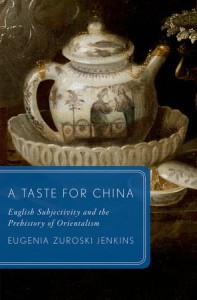
Through an examination of England’s obsession with Chinese things throughout the long eighteenth century, this book argues that chinoiserie in literature and material culture played a central role in shaping emergent conceptions of taste and subjectivity. In the wake of recent scholarship in the field of eighteenth-century writing that examines English identity and nationalism in the context of trade, commodity culture, and the social role of literature, this study demonstrates how the figure of the Chinese object was variously deployed throughout the period to authorize new epistemologies and subject-object relations, ultimately redefining what it meant to be English. The book opens with a reading of Mary Wortley Montagu’s Turkish Embassy Letters that contextualizes the accumulation of imported material goods from China as part of the process by which early modern English nationalism gave way to a more commercial notion of English identity. Jenkins then considers the appearance of chinoiserie in English writing that ranges from Pepys’ diaries to Restoration drama. Subsequent chapters consider international commerce and the Far East in Daniel Defoe’s under-studied novel, Captain Singleton, and the relationship between subjects and objects in Pope’s The Rape of Lock. Broadly considered, A Taste for China shows that prior to the nineteenth century, English culture did not necessarily organize the world in terms of the orientalist binary, defined by Edward Said. By historicizing British orientalism, Jenkins reveals how the notion of the East as anathema to English identity is produced through various competing models of subjectivity over the course of the eighteenth century.
Posted: September 14th, 2013 | No Comments »
Just can’t get away from China references! Happen to be writing about China’s involvement in the First World War at the moment what with the centenary up next year – more on that to follow as it progresses. And then happened to be passing through the town of Vernet Les Bains in the Pyrénées-Orientales and came across the town’s Entente Cordiale monument – the only one in France apparently. Of course every French town has a memorial to the men of the area who fell in the war but this monument is a bit different as it celebrates the alliance between Britain and France – and all the other nations that supported the Allies in the Great War. While China wasn’t actually a combatant it did side with the allies and sent the Chinese Labour Corps to Europe so should really be included. And so it is….(more on the memorial from Wikipedia below)…
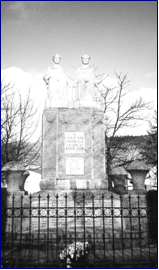
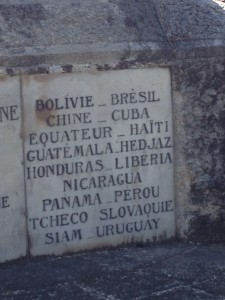
Near the highest point in Vernet-les-Bains, next to the mairie (town hall), stands a monument to the Entente Cordiale of 1904. It is the only one of its kind in France.
The pedestal of the monument is made of Canigou granite. On it rest two white marble statues representing France and Britain. The pedestal itself is set upon a circular base. That in turn is located on a raised, level area of ground which covers 1,000 square metres and which is bounded by low stone walls.
The idea of erecting this monument was conceived around 1912 by the town council and its then mayor, Monsieur Joseph Mercader. The wealthy British visitors who regularly came to this health spa at that time actively supported the project. A committee of prominent French and British patrons was set up to promote the scheme. Its leading members were Lord Roberts and General Joffre. Monsieur Lambert-Violet, a leading Perpignan businessman, gave the land for the memorial to Vernet. The monument itself was the work of the Roussillon sculptor Gustave Violet, who displayed a model of his proposed work in 1913. However, progress came to a halt in 1914 with the outbreak of World War One. Little further happened until August 1920, when it was proclaimed by presidential decree that work on the monument would proceed but that it would be dedicated both to the Entente Cordiale and to the memory of those killed during the war. At the same time a new appeal was launched for funds to complete the project.
Work on erecting the monument soon got underway. Granite was hauled up from the bed of the River St-Vincent in carts pulled by oxen. The stonemason, Monsieur Herbetta, worked up to fourteen hours a day, often in the sun’s full glare, fashioning and putting into place the enormously heavy blocks of stone. A circle of wrought-iron fencing was erected around the base of the monument. Monsieur Antoine Mercader remembers, as a six-year-old child, how he and other children watched with amazement as the craftsman, Monsieur Serra, poured molten lead into small holes in the ground to seal in place the fence’s iron bars. When the monument was completed, it bore the following dedications:
“To the Entente Cordiale between France and Britain. To the glory of the Allied Nations. To the memory of soldiers from Vernet who died for their country”
Posted: September 13th, 2013 | No Comments »
Published in 1902, Morse’s Glimpses of China and Chinese Homes was a follow up to his popular Japanese Homes and Their Surroundings. His trip to China was mostoly to write for American Architect, and his article for them form the basis for this book. Also included are a number of sketches. Morse knew Japan better than China and had been a professor of Zoology at Tokyo University but this is still a lovely book with some charming sketches.
If you want to read the text you can download it here.
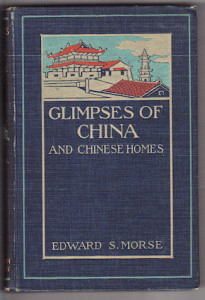
Posted: September 12th, 2013 | No Comments »
French philosophy and theory takes on 1970s China – not always a happy meeting!

In 1974 Roland Barthes travelled in China as part of a small delegation of distinguished French philosophers and literary figures. They arrived in China just as the last stage of the Cultural Revolution was getting underway – the campaign to criticize Lin Biao and Confucius. While they were welcomed by writers and academics, the travelers were required to follow a pre–established itinerary, visiting factories and construction sites, frequenting shows and restaurants that were the mainstay of Western visitors to China in the 70s. Barthes planned to return from the trip with a book on China: the book never materialized, but he kept the diary notes he wrote at the time. The notes on things seen, smelled and heard alternate with reflections and remarks – meditations, critiques or notes of sympathy, an aside from the surrounding world. Published now for the first time more than thirty years after the trip, these notebooks offer a unique portrait of China at a time of turbulence and change, seen through the eyes of the world’s greatest semiotician.
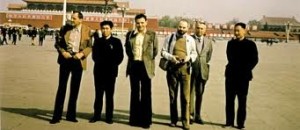
Posted: September 12th, 2013 | No Comments »
Watching the movie of the relationship between Coco Chanel and Igor Stravinsky the other night reminded me of Chanel’s tastes for Chinoiserie. There’s a rather nice moment in the movie when Coco welcomes the Stravinsky family (exiled White Russians by this time) into her villa Bel Respiro at Garches and shows them the China Room. However, Chanel had Chinoiserie wherever she lived be it her Parisian apartment at 31 Rue Cambon, her French Riviera villa La Pausa or her suite of rooms at the Paris Ritz. Chinoiserie wherever she was in residence…
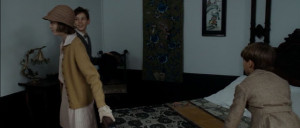
the movie recreation of Chanel’s China Room at Bel Respiro in Garches
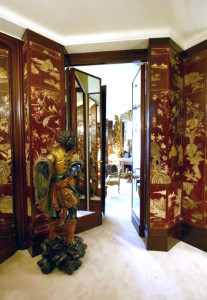
Chanel’s China screen at 31 Rue Cambon in Paris
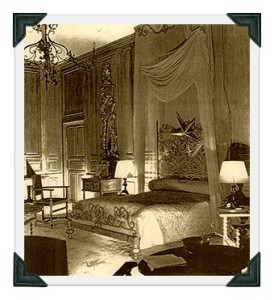
Chanel’s bedroom at La Pausa on the Riveria which was draped in Chinoiserie fabrics and wallpaper
Posted: September 11th, 2013 | No Comments »
Gene Luen Yang’s Boxers is a great idea – a graphic novel that depicts the Boxer Rebellion in 1900 and tries to explain both sides. It’s actually a diptych of graphic novels called Boxers and Saints (sorry, I’m not really au fait with comic culture). Saints is about an unwanted daughter who finds acceptance among the Christian missionaries and their Chinese converts. Anyway, there’s an article here on the books and an interview with the artist who also has a very cool site here too. And, there’s a brilliant trailer on Youtube too.
And of course – you can buy the books here….
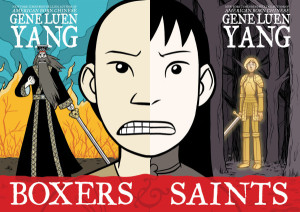
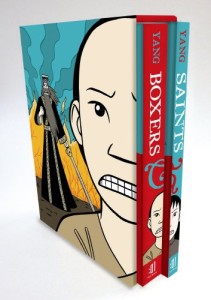
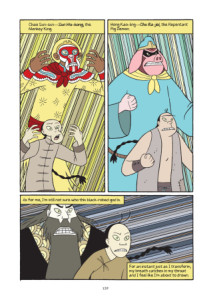
Posted: September 11th, 2013 | No Comments »
A slightly different take on Ferguson (usually most writing is about his missionary work or newspaper activities in Shanghai) from Lara Jaishree Netting…
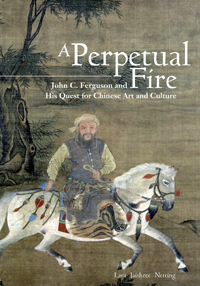
After serving as a missionary and then foreign advisor to Qing officials from 1887 to 1911, John Ferguson became a leading dealer of Chinese art, providing the Metropolitan Museum of Art, the Cleveland Museum of Art, and other museums with their inaugural collections of paintings and bronzes. In multiple publications dating to the 1920s and 1930s, Ferguson made the controversial claim that China’s autochthonous culture was the basis of Chinese art. His two Chinese language reference works, still in use today, were produced with essential help from Chinese scholars. Emulating these “men of culture†with whom he lived and worked in Peking, Ferguson gathered paintings, bronzes, rubbings, and other artifacts. In 1934, he donated this group of over one thousand objects to Nanjing University, the school he had helped to found as a young missionary.
This work offers a significant contribution to the history of Chinese art collection. John Ferguson learned from and worked with Qing dynasty collectors and scholars, and then Republican-era dealers and archeologists, while simultaneously supplying the objects he had come to know as Chinese art to American museums and individuals. He is an ideal subject to help us see the interconnections between increased Western interest in Chinese art and archeology in the modern era, and cultural change taking place in China.
Lara Netting received her PhD in East Asian Studies at Princeton University in 2009. She has held a Getty Fellowship at the Asia Society Museum and the J. Clawson Mills Fellowship at The Metropolitan Museum of Art.
“Art collectors continuously shape and reshape our view of the artistic past, determining what later generations are able to see and how they see it. Between 1912 and 1943, the Canadian-American John C. Ferguson led a public career in Republican China that would have made a Chinese scholar proud, serving as a major government advisor and influential academician. From deep inside of the Beijing and Nanjing cultural circles, as a private collector and buyer for American museums (the Metropolitan Museum and Cleveland Museum of Art among others), he helped to dramatically redirect American interests in Chinese art from the taste of Japanese aficionados to that of the Chinese literati. Lara Netting’s thorough study brings the remarkable and complex John Ferguson back to life. She restores to him the credit he has long deserved, while at the same time using his example to demonstrate how our definition of ‘art’ is an ever-changing construct.â€
—Jerome Silbergeld, Princeton University
“Missionary, dealer, collector, and scholar, John Ferguson aspired to the lifestyle and status of a Chinese literatus and was the first Westerner to seriously collect calligraphy as well as Ming and Qing painting. Lara Netting’s meticulously researched study offers a long overdue assessment of Ferguson’s life and legacy—both in China and the West.â€
—Maxwell K. Hearn, The Metropolitan Museum of Art













